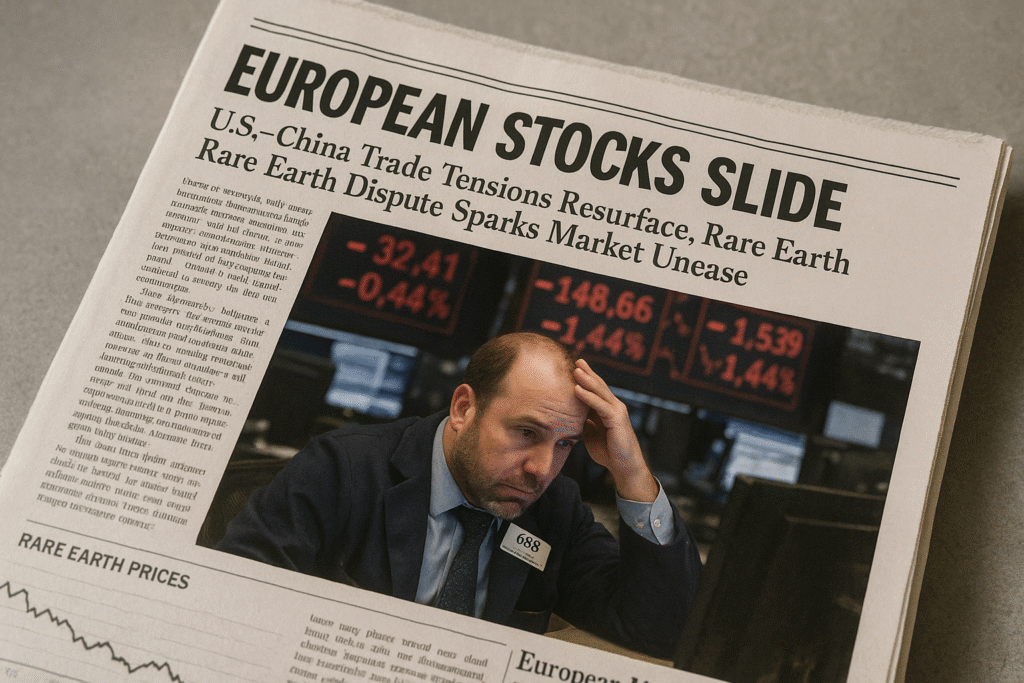By Harshit LONDON — October 14, 2025
European stocks fell to two-week lows on Tuesday, reversing early-week optimism as investors grappled with renewed trade tensions between the United States and China. The declines came after U.S. President Donald Trump threatened new tariffs in response to China’s export controls on rare earth minerals, reigniting fears of a broader trade confrontation that could destabilize global markets.
European Markets Dip as Trade Fears Escalate
The pan-European Stoxx 600 was last seen 0.6% lower, recovering slightly from steeper early losses. Germany’s DAX index fell 0.9%, touching a new two-week low by midafternoon in London, while France’s CAC 40 slipped 0.14%. Italy’s FTSE MIB dropped 0.3%, and Britain’s FTSE 100 managed a modest 0.06% gain. Spain’s IBEX 35 edged 0.3% higher, providing one of the few bright spots across the region.
The downturn followed President Trump’s comments threatening to “financially counter” Beijing’s latest export curbs on rare earth minerals — essential components in defense, semiconductor, and electric vehicle industries. Although Trump later suggested on Truth Social that “trade relations with China will all be fine,” markets reacted cautiously.
Mining and Defense Stocks Lead Losses
European mining stocks bore the brunt of the sell-off, with the Stoxx Basic Resources Index tumbling 2.1%. Rare earth metals are vital to global supply chains, and China’s control of nearly 70% of global output has heightened concerns about future bottlenecks.
Defense shares also fell sharply. The Stoxx Europe Aerospace and Defense Index dropped 1.5%, reflecting investor unease over the minerals’ role in manufacturing military technology such as fighter jets, submarines, and radar systems. German contractors Renk and Rheinmetall each slid around 3%, while Italy’s Leonardo declined 2%.
Corporate Movers: Michelin Falls, Ericsson Surges
French tire giant Michelin saw its shares plunge 9% after cutting its full-year outlook, blaming “further deterioration of the business environment.” Despite volume growth in the third quarter, the company reported that North American sales dropped nearly 10% due to weaker demand and tariff-related competitiveness issues. A weaker U.S. dollar also weighed on results.
In a research note, Deutsche Bank slashed its target price for Michelin by 16.2%, with analyst Christoph Laskawi writing that “the magnitude of the cut is far bigger than expected.”
Meanwhile, Swedish telecoms giant Ericsson was a standout gainer, soaring 18% after reporting third-quarter earnings that far exceeded forecasts. The company’s net income surged 191% year-over-year, reaching 11.3 billion Swedish kronor ($1.2 billion). CEO Börje Ekholm attributed the performance to “strong operational execution” and a 9% growth in Cloud Software and Services, primarily driven by core network expansion.
Oil major BP also made headlines after announcing up to $500 million in post-tax asset impairments ahead of its upcoming earnings release in early November. BP shares fell 1.7% following the announcement.
Currency Moves: Pound Slides After Jobs Data
The British pound weakened against major currencies, falling 0.3% versus the U.S. dollar and 0.4% against the euro. The decline followed data from the U.K. Office for National Statistics, which showed the unemployment rate rose to 4.8% in the three months through August — slightly higher than economists’ forecast of 4.7%.
The move pushed sterling to its lowest level against the dollar since early August, as investors reassessed expectations for the Bank of England’s monetary policy amid signs of a cooling labor market.
Eyes on Global Economic Outlook
Market attention now turns to Washington, D.C., where policymakers and economists are gathering for the IMF and World Bank annual meetings. The International Monetary Fund is set to release its World Economic Outlook report, offering insights into global growth prospects amid geopolitical tensions, sluggish trade, and persistent inflationary pressures.
The meetings bring together global finance ministers, central bankers, and private sector leaders to address the world’s most pressing economic challenges — from poverty eradication to long-term development goals.

